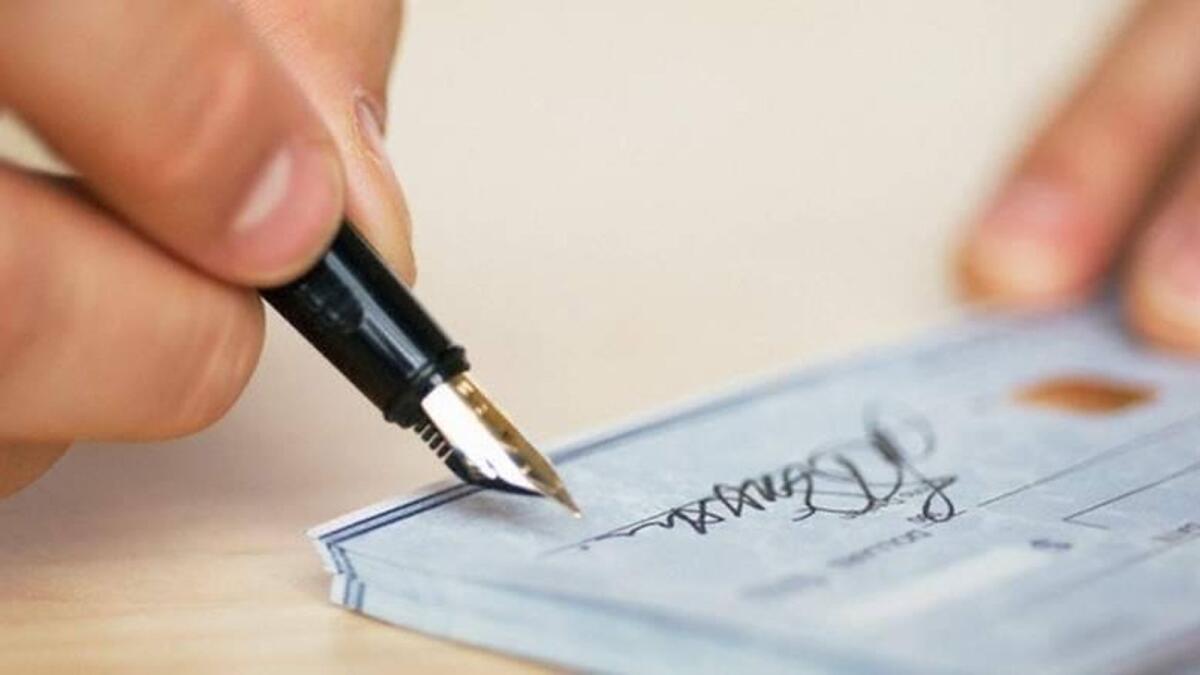Major amendments made to UAE Federal Law with aims to achieve faster and easier procedures

Filer photoby Sherouk Zakaria
Published: Tue 28 Dec 2021, 4:14 PM
Last updated: Tue 28 Dec 2021, 10:44 PM
Starting January 2, 2022, bounced cheques will be decriminalised across the UAE, except those issued in bad faith.
The Federal Decree-Law No. 14 of 2020 presented major amendments to Federal Law No. 18 of 1993 promulgating Commercial Transactions with aims to achieve faster and easier procedures, while maintaining justice and supporting a sustainable economy.
The new version of the law obliges banks to make partial payments by releasing any available funds in the bank account unless the holder disagrees. For tenants, for example, this means that if an account fell short for a rent instalment, the bank is obliged to fill in the rest from the tenant’s account, unless the tenant refuses so.
ALSO READ:
- UAE: New amendments on cheque provisions to take effect from January 2
- Dubai Courts begin decriminalising bounced cheque cases
Previously, banks only made partial payments at the holder’s request.
While previously, beneficiaries of bounced cheques needed to make a police report, the new law enables them to directly approach the court’s execution judge to order payment of the full – or remaining – cheque’s value in an accelerated and easy procedure that reserves the rights of all parties.
Here’s everything you need to know about the new amendments:
What are the amendments that have been made to the Commercial Transactions Law?
Abdulrahman Junaid, Senior Associate at ADG Legal: One of the major amendments is that the beneficiary of a bounced cheque, after obtaining a certificate from the bank, may use the cheques to directly open a civil execution file against the drawer, including the right to seize assets in the name of the drawer.

Abdulrahman Junaid, Senior Associate at ADG Legal. Supplied photo
How has the compliant process changed under the new law?
Abdulla Ziad Galadari, Senior Partner in Galadari Advocates and Legal Consultants: Under the new version of the law, the only case where a criminal case for a bounced cheque can now be filed is in an event of a fraud. The cheque can now be presented to the court for the issuance of an executory order. Previously, police were involved in the process of recovery of debt, which was not an optimum utilisation of their expertise and time.
The earlier Dubai decree had set up fast track courts for dealing with bounced cheques and the norm for bounced cheque was penalised by a jail term and the issuance of fines.

Abdulla Ziad Galadari, Senior Partner in Galadari Advocates and Legal Consultants. Supplied photo
Have all bounced cheque cases been decriminalised?
Junaid: There are certain acts by the drawer related to bounced cheques continue to be criminally sanctionable.
The new law specifically refers to the following acts, which if committed by the drawer, will be considered a crime of a bounced cheque punishable by criminal sanctions. These acts include the following:
- If the drawer orders the bank to not cash the cheque before the due date;
- If the drawer closes the account or withdraws the available balance prior to the due date;
- If the drawer deliberately signs the cheque inaccurately;
- If the drawer intentionally writes or signs the cheque in a way that prevents its cashing. Previously, criminal actions could be filed in all matters related to bounced cheques which has now been limited under the new law.
What are the penalties for bounced cheques cases?
Galadari: Fines will be determined depending on the criminal act. Since bounced cheques have been decriminalized, there is no jail term unless fraud can be proven. This is a matter of relief, giving people an opportunity to settle their dues especially when there are extenuating circumstances.
However, penalties for bounced cheques will depend on the amount due. There will be a fine of Dh2,000 for Dh50,000, while bounced cheques of between Dh50,000 and Dh100,000 will have to bear a Dh5,000 penalty, with a penalty of Dh10,000 for cheques between Dh100,000 and Dh200,000.
The below acts are also punishment by imprisonment for no less than one year in addition to a penalty of no less than Dh20,000 (twenty thousand) and not exceeding Dh100,000 (one hundred thousand):
Forging or counterfeiting a cheque, or attributing it to a third party by changing details through addition, deletion or other means.
- Knowingly using a forged or counterfeited cheque.
- Knowingly accepting funds paid through a forged or counterfeited cheque.
- Using a real cheque issued in the name of others, inappropriately benefiting from it, or using it in relation to a crime of fraud.
- Knowingly importing, manufacturing, getting, gaining, selling, offering or providing any tools, equipment, software, information or data used in the crime of forgery.
What are the legal obligations of a person whose cheques have bounced?
Junaid: The law expressly specifies that pursuing a criminal remedy for a bounced cheque offense will no longer be available only if the cheque is bounced due to insufficient funds. The drawer will, however, continue to remain liable for civil claims. If the drawer commits any of the criminal acts mentioned above, the drawer will be liable for fines and/or jail term.
If a complaint is filed against someone for issuing cheques without sufficient balance, will that be on police/judicial record?
Junaid: There will be no criminal record if the cheque is bounced for insufficient funds. However, the civil court will maintain the records of the drawer if any civil claims are filed related to the bounced cheques.
How can bad faith, which puts the offender under criminal offence, be proven?
Proving a bad faith is a discretionary authority for a competent court based on the evidence submitted and facts drawn by the court. A drawer’s bad faith is also proven if the account is closed, frozen, the entire fund has been withdrawn, or if the bank was instructed to refrain from lawful payment, or if he deliberately writes the cheque or sign it in a way that prevents it from being cashed.
How do the amendments protect the rights of a person complaining against bounced cheques?
Galadari: Now, the bearer of the cheque can present the cheque to the court for the issuance of an executory order to recover the money. The new developments support the rights of both the cheque drawer and drawee by making the cheque collection more effective. The aim of this amendment is to expediate the process as opposed to delaying it by a jail term penalty.
What is the timeframe for recovering the money?
Junaid: The timeframe may vary anywhere between four months and above depending on the location of assets and whether the drawer is in the country.
How does the new law make procedures faster?
Strong civil alternatives lead to the collection of the cheque value in the fastest and simplest possible way, including:
- Obligating the bank to pay the cheque (at least partially.
- Making a cheque from the drawee’s bank account with non-sufficient fund an executive document to be implemented directly through the execution judge, without resorting to lengthy legal procedures, as was the case previously.
- This means that there is no need to file a police report, or a complaint and ensuing follow-up of procedures with the police and prosecution, then the courts. In this case, the cheque has the power of an executive bond that does not require a court ruling, which should expedite legal action. This should strengthen the cheque as a payment tool in commercial and financial transactions.
In what cases can a holder reject a bank’s payment of the cheque’s partial value?
Although the law permits the bank (the drawee) to refrain from paying if it receives the holder’s opposition to this payment, it has narrowed the cases in which this opposition is permissible, limiting it to cases of cheque loss and bearer bankruptcy only, so that the cheque performs its intended function as a tool of payment.
Article originally published on Khaleej Times.



